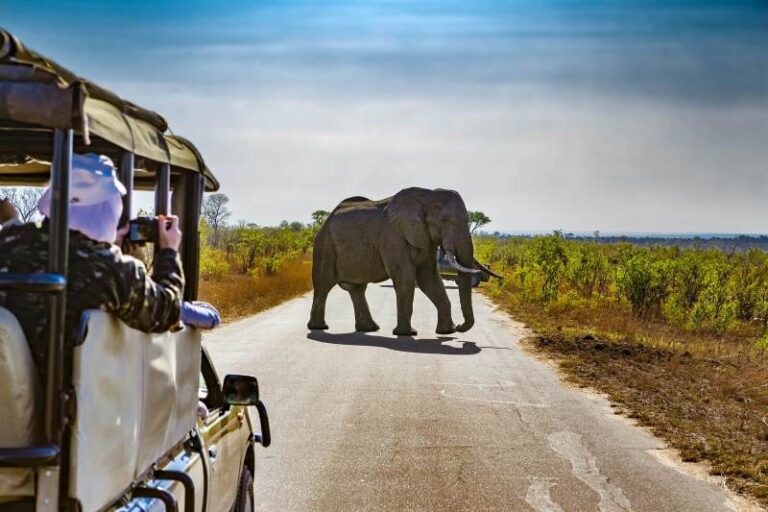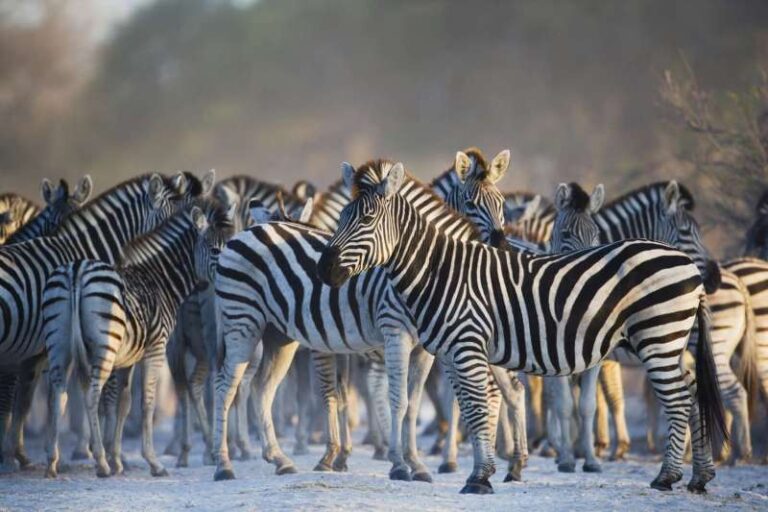Where Do Lions Live? (best Places To See Lions In Africa) – If you’ve ever been fascinated by the antics of lions and found yourself wondering where these amazing creatures call home, you’re in for a treat.
Today, we will delve deeper into the lives of lions, explore their natural habitats, and the types of habitats they inhabit, and touch on some of the efforts to protect these formidable animals.
Where Do Lions Live? (best Places To See Lions In Africa)

When you think of lions, Africa probably comes to mind first, and for good reason. Africa is the home of the lion and has the largest population of these giant animals.
The Fast, Furious And Brutally Short Life Of An African Male Lion
In particular, lions are found mostly in sub-Saharan Africa, growing in a variety of ecosystems from large savannas to arid plains. These areas provide them with ample hunting ground and plenty of prey to eat.
Lions are often associated with the African savannah, and for good reason. The Savanna offers a combination of open grasslands and sparse woodlands, making it ideal for hunting. Lions can be bundled into tall grass, chasing their prey with great agility. An abundance of herbivores such as zebras, badgers and wolves provide a balanced diet.
Another important habitat for lions is grassland. These open spaces, found in areas such as East and Southern Africa, have few hiding places for prey, making it easier for lions to attack animals. Grasslands also provide vantage points on low elevations or mountains, allowing lions to explore their surroundings better.
Although not as common for lions as savannahs or grasslands, woodlands can be home to these big cats. Some dreams correspond to places where there are many trees and forests. The presence of prey such as buffalo and antelope is an important factor in maintaining lions in these areas.
Fun Facts About Lions • African Lion Information For Kids
Surprisingly, lions can be found in arid places like the Kalahari desert. These lions are well adapted to harsh conditions, often rely on small prey and must travel long distances to find food and water. It is interesting to see how flexible and flexible they can be in such challenging environments.
Unlike other big cats, lions have large populations and live in groups called dens. A pride usually consists of several lions, their cubs, and a few older males. This social structure plays an important role in their ability to succeed in many areas. The cooperation shown during the hunt and protecting the area ensures that the lions have a greater chance of survival.
Lions are also known to be territorial, marking their range with scents and roars to warn other lions away. Their territories can cover anywhere from 20 to 400 square kilometers, depending on the richness of the habitat. A well-maintained community provides safe food, water, and shelter for proud members.

While Africa is undoubtedly the main habitat for lions, did you know that there are still small lions in Asia? These are known as Asiatic lions, and they live in the Gir forest in the Indian state of Gujarat. The Asiatic lion is smaller and has a different skin on its belly, which makes it different from its African cousins.
About Mountain Lions
Asiatic lions are critically endangered, and efforts are ongoing to protect and expand their populations. Conservation measures include habitat restoration, anti-bullying laws, and community intervention programs to reduce human-animal conflict. Learning about Asiatic lions adds another level of understanding to where lions live in the world.
Unfortunately, lions face many threats that affect their habitat and how they can thrive. Habitat loss due to human exploitation, poaching, and human conflict are some of the major issues they face. These threats have led to a significant decline in lions over the years.
Fortunately, many organizations are committed to lion conservation. From establishing protected areas to implementing community-based projects, these organizations work tirelessly to ensure lions have safe habitats to live in:
You don’t have to be a conservationist to help save lions. Simple actions like raising awareness, supporting conservation groups, and making responsible travel choices can make a big difference. Every little bit helps to ensure that these great creatures continue to roam the earth for generations to come.
Where Do South Africa’s Live Exported Lions Go?
One of the most famous lion habitats in the world is the Serengeti National Park in Tanzania. Spread over 14,750 square kilometers, this park is home to the largest number of lions in Africa. The vast plains provide the perfect environment for these birds to thrive, making it a must-visit for anyone interested in seeing lions in their natural habitat.
In South Africa, Kruger National Park is another important bastion of lions. With a variety of landscapes from dense forest to open savanna, the Kruger provides a versatile environment for its lions. The park’s extensive network of trails and excellent wildlife management practices make it an ideal destination for lion lovers.
When it comes to Asiatic lions, Gir Forest National Park in India is the place to be. Covering about 1,412 square kilometers, this park is the last habitat of Asiatic lions. Home to around 600 lions, this sanctuary is a testament to the success of conservation efforts.

Overpopulation in lion territories often leads to conflict. Livestock exploitation by lions can cause conflicts between local communities and these big cats. Farmers and herders may resort to retaliation to protect their livelihoods, and this may exacerbate the problem.
Where Do Lions Live In Africa? Savannas, Grasslands, Woodlands
While the lion sculpture is equally true of the African continent, it is important to remember that Asiatic lions did exist. Although their numbers are small, their presence in the Gir forest of India shows the diversity of lions beyond Africa.
Contrary to popular belief, lions can live in different places than the open areas of the savanna. From rainforests to arid deserts, lions show an amazing ability to adapt to many living things. These changes reflect the importance of maintaining diverse habitats for survival.
Climate change may alter the distribution and availability of prey, directly affecting lions. As herbivores move into new areas in search of food and water, lions must adapt to these changes, which often leads to human-lion conflicts in new areas.
Rising temperatures and changing climate conditions could reduce lion habitats. Drought can dry up water sources and reduce vegetation, making it difficult for lions and their prey to survive. Conservation efforts are increasingly focused on reducing these impacts to ensure the survival of lions.
Best 10 Places To Visit In Tanzania
Small, sparse populations of lions are at risk of inbreeding, which can lead to genetic defects and reduced susceptibility to disease. This issue is particularly important for Asiatic lions in the Gir Forest, where the gene pool is limited.
Efforts are underway to determine the genetic diversity among lions. Relocating lions to new areas, establishing wildlife corridors, and encouraging natural migration can help maintain healthy genetic diversity. These measures are necessary for the longevity and regeneration of lions.
Ecotourism can play an important role in lion conservation. Funds generated from tourism can be reinvested in conservation projects, conservation efforts, and community development programs. In addition, tourism promotes awareness and appreciation of lions and their habitats.

However, going unchecked can have serious consequences. Human presence can disrupt natural habitats, and inappropriate tourism can lead to habitat degradation. Sustainable practices and responsible tourism are essential to ensure the benefits of tourism rather than harm to lions.
Indian State To Open New Asiatic Lion Sanctuary As Numbers Soar
Researchers use a variety of methods to track and study lions, including GPS collars and camera traps. These resources provide valuable data on lion movements, behavior, and population changes. This information is important for information storage systems.
Many scientific studies are collaborative efforts involving local communities, governments, and international organizations. This approach ensures that research results are used effectively in conservation and that local communities participate in lion conservation.
Despite the challenges, there is hope for the future of lions. Conservation successes, such as the increase in lions in Botswana and the increase in Asiatic lions in India, show what can be done with united efforts. A continued focus on habitat conservation, community involvement, and scientific research is essential to sustaining these good practices.
As a student and responsible global citizen, you play an important role in this journey. From spreading awareness to supporting conservation programs, your actions can contribute to ensuring that lions continue to grace our planet. Imagine a world where future generations can experience the awe of seeing a lion in the jungle together, we can do it.
Is It Ethical To Hunt Captive Lions?
ALERT also works with communities to meet the challenges of living with this endangered predator, while conducting research to improve our understanding of lion behavior in African ecosystems to better inform decision-making. Lions have captured our imaginations for centuries. Stars of movies and characters in books, lions are at the top of the food chain. The Swahili word for lion, simba, also means “king,” “powerful,” “furious.” The word lion has the same meaning in our vocabulary. If you call a person with the heart of a lion, you are describing a brave and courageous person. If you deceive someone, you treat them with great interest or importance.
The main habitats of lions are open woodlands, dense grasslands, and brushy habitats, where there is ample protection for hunting and hunting. Grasslands also provide food
Best places to see in africa, where in africa do lions live, best place to see lions in africa, where to see lions in south africa, places to see in south africa, best places to see in south africa, south africa places to see, must see places in africa, where to see gorillas in africa, where do lions live in africa map, where to see penguins in south africa, where to see giraffes in africa




